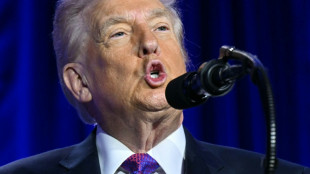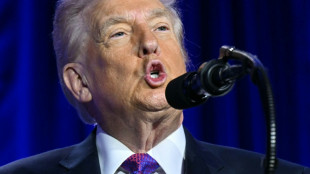

GM shares soar on better tariff outlook and EV backpedal
General Motors shares soared Tuesday after reporting strong results as it adjusts strategy over US President Donald Trump's tariffs and slashing of economic support for electric vehicles.
The giant US automaker -- which has faced tough questions over the impact of Trump's policy pivots -- reported better than expected third-quarter profits and boosted some full-year projections.
The good results came despite a $1.6 billion hit to write down EV investments and $1.1 billion in tariff costs in the third quarter.
Profits fell 56.6 percent to $1.3 billion, while revenues dipped 0.3 percent to $48.6 billion.
But shares rocketed up more than 15 percent in a sign investors believe better profitability lies ahead after GM's heavy lifting in recent months to reposition the company.
"When we have a clear challenge in front of us, that's when the team does their best work," Chief Executive Mary Barra said on a conference call.
"We don't sit around and you know look to blame others. We just say, 'Okay, here's the situation, how are we going to adjust to it and how quickly can we do it?"
- Pivot away from EVs -
GM reported increased deliveries in the United States and China compared with the prior-year period, while vehicle pricing remained solid, with dealer inventories below year-ago levels.
Executives described the US market as "resilient" with still-healthy demand for GM's fleet of gasoline-powered vehicles, which is dominated by sport utility vehicles and trucks.
GM also scored a jump in EV sales in the United States in a quarter that culminated with the September 30 expiration of a US tax credit of up to $7,500 for vehicle purchases. Executives said EV sales are on track for a drop in the fourth quarter but are expected to stabilize in 2026.
GM earlier this month announced the $1.6 billion cost hit from the changes in EVs.
The automaker had been aggressively investing in EV capacity throughout the presidency of Trump's predecessor, Joe Biden. It announced in 2021 a target of having its cars and trucks emissions-free by 2035.
Barra, in a letter to shareholders, said EVs "remain our North Star," but that the company's pivot was needed in recognition that the transition in the United States will take longer.
"By acting swiftly and decisively to address overcapacity, we expect to reduce EV losses in 2026 and beyond," Barra said.
At the same time GM has pulled back some EV capacity, it has bolstered investments in US plants in response to the tariffs.
In June, GM announced $4 billion in investments to expand production of plants in Michigan, Kansas and Tennessee in a plan that also shifts towards a greater mix of vehicles with internal combustion engines.
- Tariff policy tweaks -
Barra had a trying relationship with the White House during Trump's first term. On Tuesday, she thanked "the President and his team" for adjusting tariff policies, including a shift on Friday that lets the company offset some of the costs of tariffs on imported parts through 2030.
GM now sees its 2025 tariff cost hit at between $3.5-$4.5 billion, down $500 million from an earlier forecast.
The company projected full-year adjusted profits of between $12 billion and $13 billion, up from the prior range of $10-$12.5 billion.
Executives declined to go into detail on their outlook for next year, but Chief Financial Officer Paul Jacobson said "we do expect that 2026 can be better than 2025."
Analysts at JPMorgan Chase have estimated that GM's 2026 results could benefit $1 billion from a US-South Korea trade agreement that has yet to be finalized and another $1 billion annually from Trump's watered down fuel economy rules.
"The overall impression is of a company firing on all cylinders within the context of those factors that management can control, and with improving visibility with regard to those factors outside management’s control," said the JPMorgan note.
O.Meyer--JdB



